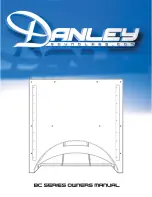
Home Theater Installations
Home Theater installations are typically medi-
um sized living rooms or game rooms that
have large flat, uncovered walls. Acoustics in
this type of installation can have a big effect
on the SPL (Sound Pressure Level) and f3 (low
frequency cut-off) of the subwoofer because
the walls are very reflective. The only ele-
ments in these installations that acoustically
“absorb” sounds are furniture and carpet.
Dramatic “Boundary Loading” can be
achieved by locating the subwoofer under a
table, next to a wall or in a corner (FIG. 4),
thus increasing SPL and lowering the f3 of the
subwoofer system. Locating the subwoofer in
the middle of the room or in a large open area
where there are few reflective surfaces will
cause a decrease in SPL and an increase in f3.
Experiment with different locations in the
room to determine which type of bass response works best in your home theater.
– 5 –
Listening Area
Left
Front
Right
Front
Center
Front
Right
Rear
Left
Rear
Subwoofer
Location
The size of the room used for your Home Theater can have a significant effect on the bass response of
your system. Since many movies exaggerate explosions, earthquakes, and other low frequency effects,
a high performance subwoofer system is required. Your Hafler subwoofer is specially designed for
these high levels of excursion and linearity. In order to get the most out of your subwoofer, Hafler has
documented the differences between typical Studio and Home Theater installations.
Typical Studio Installations
In typical studio installations, damping material is usually used on the walls and ceilings make the
room “acoustically dead." In this type of anechoic environment, the subwoofer will tend to experience
minimal “Boundary Loading” effects. Firing the subwoofer downward (FIG. 1) or directly facing for-
ward (FIG. 2) and keeping the cabinet at least 5” (12.7 cm) away from any wall will provide best
results.
FIG. 1
Downward Firing
FIG. 2
Forward Firing
Keep subwoofer enclosure 5”
(12.7 cm) from any wall
Installation










































